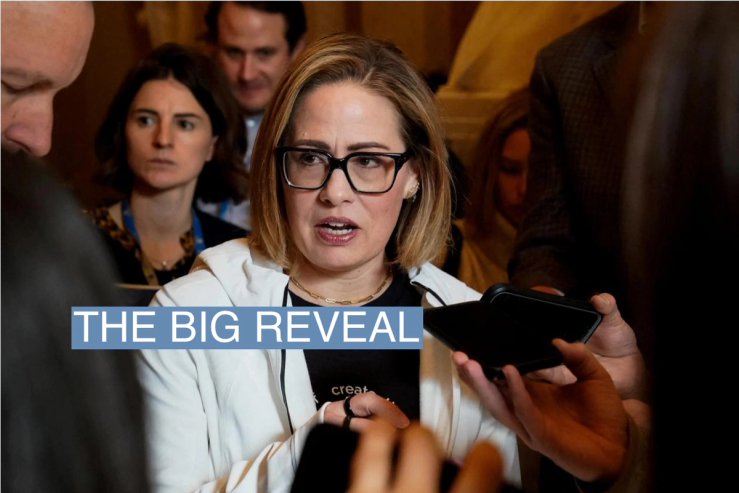The News
Senate negotiators released the long-awaited text of their bipartisan border security deal Sunday night, a months-in-the-making effort that would dramatically reorganize the U.S. asylum system while giving the president new emergency powers to limit the flow of migrants into the country.
“We’re radically changing the way we’re spending dollars on border security and the asylum process,” said Sen. Kyrsten Sinema, I-Ariz., who led talks alongside Sen. James Lankford, R-Okla. and Chris Murphy, D-Conn.
Senate Majority Leader Chuck Schumer announced plans for a procedural vote on the new border bill Wednesday as part of a broad national security package wrapping the measure together with aid to Ukraine and Israel. His Republican counterpart, Minority Leader Mitch McConnell, called on the Senate to “carefully consider the opportunity in front of us and prepare to act.”
Republicans last year demanded that Democrats agree to stricter border policies in return for unlocking new military support for Kiev. But the deal’s future is already in question thanks to strong opposition from House Republicans, whose leaders immediately slammed the border proposal as an unacceptable sop to liberals shortly after its debut.
Conference Chair Elise Stefanik dubbed it the “Joe Biden/Chuck Schumer Open Border Bill,” while Majority Leader Steve Scalise promised it “will NOT receive a vote in the House.” Speaker Mike Johnson declared he’d “seen enough” and that the legislation was “dead on arrival.”
Senate conservatives also signaled they intended to slow or stop the deal. “No self-respecting senator should agree to vote on this 370-page bill this week,” Sen. Mike Lee tweeted. “Any 41 senators can prevent the bill from proceeding.”
In this article:
The Details
To satisfy immigration hawks, the agreement would create a stricter asylum process while providing the president new emergency powers allowing for the quick expulsion of migrants. Among other measures, it would:
- Significantly limit the president’s ability to let migrants temporarily settle in the country temporarily under humanitarian parole while their asylum cases are pending, ending a practice often derided as “catch and release.”
- Raise the standard for initial asylum screenings, which would be heard within 90 days.
- Take asylum cases out of the hands of immigration judges — who currently have a 3-million-case backlog — and place them under Department of Homeland Security officials, who would be required to resolve them within six months.
- Allow the president to halt all new asylum claims by migrants, unless they arrive at an official port of entry, if border crossings pass 4,000 per day over a two-week period. The pause would become mandatory if crossings hit 5,000 per day. Migrants who arrive between ports of entry, such as by crossing the Rio Grande, would be promptly expelled without a hearing.
Of the policy measures, the new emergency powers have arguably garnered the most attention. “We are creating this emergency authority so that when the system is overwhelmed, we can shut it down,” Sinema told reporters. President Biden would exercise that emergency authority “immediately on day one” given current levels, a senior Biden administration official told reporters Sunday night. However, Republicans have attacked it, arguing the president should be able to shut down asylum claims if there are any illegal crossings.
Along with policy changes, the bill would also include billions more in funding for policing the border — including $650 million allocated for further construction of the border wall.
Pro-immigration groups are already attacking the deal for making major concessions on the border without winning any traditional Democratic priorities, such as protections for Dreamers. To sell the deal to the left, Murphy called it “an important down payment on immigration reform,” emphasizing that it would create “a quicker, fairer asylum process” without the years long waits for decisions, as well as some new legal paths to immigration. It would:
- Provide 50,000 new employment and family reunification visas per year for the next five years.
- Establish a right to legal counsel for asylum-seekers during expedited removal proceedings. In addition, lawyers would be provided to unaccompanied children aged 13 and under.
- Provide a pathway to citizenship for Afghan allies evacuated by the US during the fall of Kabul in August 2021
The bill would also try to address the complaints of Democratic mayors who’ve seen their cities’ social services budgets stretched thin thanks to the arrival of migrants, by issuing quicker work permits to asylum seekers who do make it past their initial screening. Perhaps just as importantly, the new, stricter border measures have a variety of exceptions that could make them more palatable to Democrats.
While it would cut off the use of humanitarian parole at the border, it could still be used in other circumstances, such to aid war refugees or let individuals travel to the U.S. for medical treatment. The president’s new emergency powers also wouldn’t allow the president to entirely shut down the border to asylum seekers since legal ports of entry would still be required to process at least 1,400 claims a day.
“The border never closes, but claims must be processed at the ports,” Murphy tweeted. He also pointed out that the emergency authority would sunset in three years.
Those exceptions have already drawn the ire of conservatives, however. As he pronounced the bill DOA, Speaker Johnson quoted Murphy’s own description: “As the lead Democrat negotiator proclaimed: Under this legislation, ‘the border never closes.’”
The View From James Lankford
During a Sunday night press call, Lankford said he intended to get in touch with Johnson to discuss his bill, even though the speaker had just deemed it a dead letter. He also expressed hope for the legislation despite the statements from House GOP leaders, noting he’d been receiving encouraging text messages from some lower chamber Republicans who were supportive of the legislation.
“This is a member-driven body...especially right now with how divided the House is and how close the numbers are,” he said.

